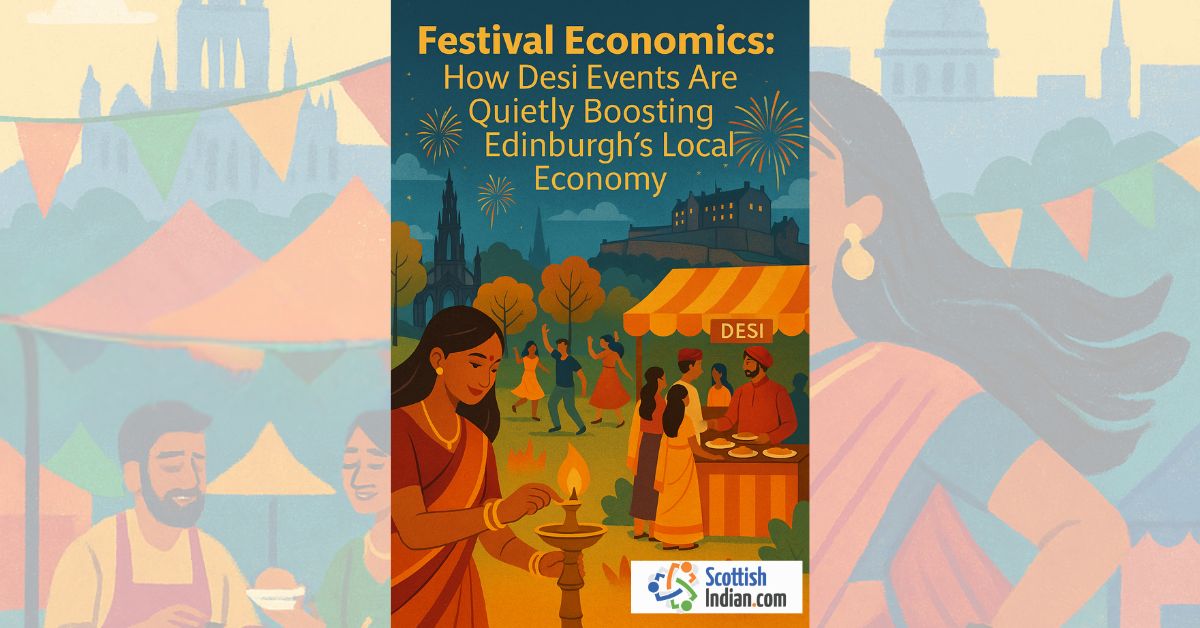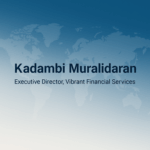From Diwali in public parks to weekend food pop-ups! here’s how South Asian celebrations are creating economic ripple effects.
Every autumn, the skies above Edinburgh shimmer with fireworks and not just for Bonfire Night, but for Diwali, the Festival of Lights. Temples bustle, parks glow with lamps, and the unmistakable scent of samosas and chai wafts through community halls and weekend markets.In fact, Edinburgh’s official Diwali event attracts thousands of locals and tourists alike, adding cultural vibrance to the winter calendar.
What was once a niche celebration for immigrant families is now a cultural and economic force. And while mainstream media often overlooks it, Desi festivals are quietly boosting Edinburgh’s local economy from food stalls to florists, caterers to cabbies.
This is festival economics, Desi-style.
🪔 It’s More Than Just Culture. It’s Commerce
Community-run festivals like Diwali, Pongal, Eid, Navratri, and even Onam in private venues are now mini-industry events in their own right.According to VisitScotland’s event impact report, grassroots festivals and cultural gatherings contribute meaningfully to Scotland’s local economy and tourism engagement.
These aren’t just gatherings of cultural pride. As they generate:
- Revenue for local halls, event venues, and Edinburgh’s hotels
- Business for local printers, designers, and stage decorators
- Demand for clothing shops, jewellery vendors, and artists
- Catering orders from Desi restaurants and home-based cooks
- Footfall for independent groceries and South Asian supermarkets
For example, the festive melas hosted by cultural organisations can draw hundreds of attendees, each spending on food, sweets, crafts, and services.
👉 Explore Edinburgh-based Desi vendors in our Business Directory
📊 The Local Economic Multiplier
A 2023 report by the Edinburgh Chamber of Commerce noted that “community-based ethnic festivals contribute to the soft power and service economy of the city.” In practical terms:
- Every £1 spent at a Diwali or Eid fair may generate £1.50–£2.00 in extended local economic activity
- Family events encourage bulk shopping like sweets, new outfits, gifts
- Travel and transport providers benefit from guests commuting across the city
- Airbnb and short lets see spikes during festivals with visiting relatives or touring performers
Even unofficial events, like Diwali house parties, often trigger large group food orders from local Desi takeaways. Business Gateway Scotland notes that pop-up opportunities at festivals are a popular entry point for minority-led businesses seeking visibility and low-risk market testing.
🧾 Read more about how Edinburgh’s tourist tax may affect these patterns.
🍛 Food Stalls: A Powerful (and Often Overlooked) Engine
From Pani Puri stations to idli-sambar counters, food is at the heart of every Desi event and also the largest informal economic contributor.
Pop-up stalls at festivals provide:
- A platform for home chefs and aspiring entrepreneurs
- Safe entry points into the hospitality market
- Affordable access to new audiences
- Opportunities to test products before launching full businesses
In 2024, one festival in Leith saw over 600 attendees, with stallholders earning between £250–£1000 in a single afternoon.
These numbers may not show up in official reports but they matter deeply to Edinburgh’s micro-economy.
💃 Cultural Capital That Attracts More Than Audiences
Desi festivals aren’t just attended by the South Asian community anymore. Thanks to partnerships with city councils, universities, and tourism boards, events like:
- Navratri Garba nights
- Diwali showcases at public parks or castle grounds
- Pongal harvest feasts with dance and craft workshops
…are open to wider audiences. That means more visibility, cross-cultural engagement and yes, more economic participation.
👉 Want to attend or support one? Subscribe to our ScottishIndian.com newsletter for event updates.
Despite the economic promise, many South Asian-led festivals still lack city-level support.
Venue hire fees are high, licenses can be confusing, and Desi organisers rarely receive the kind of cultural grants extended to more established (often Eurocentric) festivals.
If the city wants to diversify its cultural calendar meaningfully, it must:
- Simplify funding access for small community events
- Offer affordable public venue options
- Include Desi festivals in Edinburgh’s “official” tourism calendar
- Measure and report economic impact of non-Western cultural events
Scotland’s South Asian communities are not just cultural contributors. They’re economic participants and city builders. Our festivals not just bring people together, but they also fuel local businesses, empower new entrepreneurs, and keep traditional crafts alive.
It’s time we count them, fund them, and celebrate them and not just for what they mean to us, but for what they bring to everyone.






